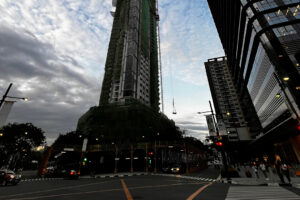‘There’s the rub’

It is in memory of Conrad de Quiros that I title this commentary about the current Philippine economy, “There’s the rub.” The late Conrad needs no elaborate introduction. Journalist Jo-Ann Maglipon narrated in her tribute that Conrad attracted a legion of fans through his column, “There’s the rub.”
Conrad’s “There’s the rub” exemplified opinion-writing that is truthful, questioning, critical, cutting, and frank. It is in this light that “There’s the rub” is a most appropriate idiom to describe our current situation. Here, I dwell specifically on our economic situation.
The economic outlook for 2024 is not bad at all. The government’s growth rate target for 2024 ranges between 6.5% and 7.5%. This is a downward revision from the original 6.5% to 8%. The independent Bangko Sentral ng Pilipinas (BSP) has a more realistic projection than that of the National Government. The BSP projects a growth rate of 5.5% in the medium term.
The international financial institutions on the whole also present estimates that signal hope and optimism, though guarded.
The International Monetary Fund (IMF) projects real GDP (Gross Domestic Product) growth of 6% and 6.1% in 2024 and 2025, respectively. The Asian Development Bank (ADB) estimates GDP growth of 6.2% in 2024. The World Bank forecasts growth of 5.8% in 2024. Ndiame Diop, the Bank’s Country Director, says that “the Philippines stands out as among the top performers” in the region, and “will continue to exhibit strong performance in the next few years.” Nonetheless, the multilateral institutions agree that the risks to their outlook are “tilted to the downside,” arising from a combination of global and domestic issues.
In a word, the Philippine economy is sailing. And therein lies the rub. Despite the National Government’s high growth target, we note that the projections of other institutions, including the independent BSP, are below what the Ferdinand Marcos, Jr. (FMJ) administration wishes.
Still and all, even the lower end of the range of forecasts, the BSP’s 5.5% growth for 2024, is nothing to sneeze at.
But there again lies the rub. For the economy in fact can move without being propelled by the current administration. We have to thank the series of transformative reforms undertaken by previous administrations.
Worth citing are the sin tax and budget management reforms during the term of the late Benigno Aquino III and the more comprehensive tax reforms and the investment-friendly and pro-consumer reforms during Rodrigo Duterte’s term. All this paved the way for sustained high growth averaging more than 6%, only to be interrupted by the COVID-19 pandemic. But with the end of the COVID-19 emergency, the benefits or advantages derived from past reform episodes translate not only into economic recovery but also accelerated growth.
I have absorbed an insight from the former Finance Secretary Carlos Dominguez III. Time and again, he would mention that a reformer in any administration must advance an agenda on the back of gains from predecessors. He likens the creation of reforms to the building of an edifice, an idea which he learned from former President Diosdado Macapagal. An edifice is built stone by stone or block by block and done over time. Reform undergoes a similar process. A good foundation or the structural reforms created by a previous administration must be built upon and further strengthened.
Again, there’s the rub. The economy is afloat, but the performance is below expectations (even based on the government’s own target). Undeniably, the current economy could have done better. And if not for the solid economic reforms done by previous administrations, we would be in trouble.
The Marcos Jr. administration is thus benefiting from the reforms undertaken by its predecessors. But it has not capitalized on said reforms or has ignored the reform platform to achieve much better outcomes.
Worse, the Marcos Jr. administration is rolling back reforms. The latest example is its determination to amend the law on fiscal incentives. The administration has ordered Congress to pass a bill that will emasculate the governance of incentives and will erode revenues resulting from provisions to grant more unnecessary tax incentives.
Further, vested interests with strong political connections have embarked on a strategy to reverse the excise tax rates on tobacco products. They are manipulating the issue of smuggling to undermine the sin tax law.
Other reforms are not moving either. Two years into the term, the administration has yet to pass a significant revenue-enhancing bill. In concluding its 2023 consultation with the Philippines, the IMF’s Executive Board “recommended adopting additional medium-term tax measures to create more fiscal space for policy priorities and social spending.”
In the same vein the “Directors welcomed the authorities’ commitment to reform the military and uniformed personnel’s pension system.” The said pension system, which is overgenerous and fully funded by the government, to quote Finance Secretary Benjamin Diokno, is “not sustainable.” Worse, said Diokno: “If this goes on, there will be a fiscal collapse.”
Sadly, the much-vaunted reform of the pension system of the military and uniformed personnel seems to be dead in the water.
In this regard, I wish Finance Secretary Diokno would reiterate his past admonitions: Any administration must institute hard or bold reforms at an early stage of its term when it enjoys huge political capital and goodwill. Otherwise, say goodbye to the reforms. Otherwise, in the current case, the threat of a “fiscal collapse” becomes real.
The window of opportunity is closing. The factions of the ruling administration are now fighting, and the politicians are now shifting their attention to the forthcoming midterm elections. Polarization and uncertainty, not policy coherence and predictability, dominate.
In short, the favorable forecasts about the economy can deceive. They do hide serious problems. And they can make the administration complacent. There’s the rub.
The growth we are having is the offshoot of solid reforms undertaken in the past. But the present administration is not building on these reforms. Worse, it is withdrawing major reforms or threatening to revert them.
Remember what happened during the Fidel Ramos administration (1992-1998). Almost everyone was ecstatic about the high economic growth. But there was an underlying problem that the Ramos administration and the technocrats ignored. Amid high growth rate and low inflation, amid the triumph of liberalization and deregulation, the problem of an overvalued currency resulting from capital account liberalization and manifested in a current account deficit was a vulnerability that turned the boom into bust. In 1997, the Philippines was hit by a financial crisis. Before the end of the Ramos administration, the economy crashed. The Marcos Jr. administration should take heed of the lessons. Never be complacent. Focus on the binding constraints. Do not deceive oneself by cosmetic reforms.
Perhaps, the Marcos Jr. administration might get lucky and escape a crisis. But without the furtherance and consolidation of reforms, the economy will continue to underperform, and investments will shy away from our country.
Assuming that the underlying reasons of underperformance are unresolved but that Marcos Jr. is able to do a magic act, the worst will still happen. The next administration will inherit the major problems. And we might again suffer a lost decade.
But let’s not end this commentary in despair. After all, it is the new year.
Again, in memory of Conrad de Quiros, I cite his column published by the Inquirer on Sept. 17, 2014, the very year that he suffered a major stroke. The column’s title and central message (although the content and context of what he wrote then and my commentary now are totally different): “Hope springs eternal.”
We hope that in 2024, President Marcos Jr. will surprise us by carrying out the reforms that have to be done and propel Philippine development to greater heights. May President Marcos Jr. heed what fellow columnist Diwa Guinigundo wrote (“2024: Harnessing hope for change,” Manila Bulletin, Jan. 4, 2024): “With hope, we should by all means create these doors of opportunities for change, for progress, and for greatness.”
Filomeno S. Sta. Ana III coordinates the Action for Economic Reforms.




